As horse owners and caretakers, it is our responsibility to ensure the well-being of our equine companions. One prevalent concern among horse owners is Cushing’s disease, also known as Pituitary Pars Intermedia Dysfunction (PPID). This hormonal disorder can affect horses of all ages, but it is more commonly observed in older horses. To protect your horse’s health and quality of life, it’s crucial to understand how to prevent Cushing’s disease. In this comprehensive guide, we will explore various strategies and best practices to minimize the risk of Cushing’s disease in horses.
Understanding cushing’s disease
Before we delve into prevention strategies, let’s briefly discuss what Cushing’s disease is. Cushing’s disease is a chronic condition that affects a horse’s endocrine system. It primarily impacts the pituitary gland, leading to the overproduction of hormones, particularly cortisol. Elevated cortisol levels can result in a range of health issues, including laminitis, obesity, a compromised immune system, and a decreased ability to handle stress.
Preventive measures
Preventing Cushing’s disease in horses involves a multifaceted approach that focuses on minimizing stress, promoting a healthy lifestyle, and regular veterinary care. Here are some key preventive measures:
1. balanced diet
Provide your horse with a well-balanced diet rich in high-quality forage. Avoid excessive grain feeding, as this can lead to obesity, which is a risk factor for Cushing’s disease. Consult with an equine nutritionist to tailor a diet to your horse’s specific needs.
2. weight management
Maintain a healthy body weight for your horse. Obesity can exacerbate the symptoms of Cushing’s disease and increase the risk of laminitis. Regular exercise and controlled feeding are essential for weight management.
3. regular exercise
Ensure your horse gets regular exercise to support overall health. Exercise helps maintain a healthy weight, improve circulation, and reduce stress levels. Create a balanced exercise routine that suits your horse’s age and fitness level.
4. reduce stress
Minimize stressors in your horse’s environment. Horses are sensitive animals, and chronic stress can contribute to the development of Cushing’s disease. Provide a safe and comfortable living space, and limit exposure to loud noises and excessive commotion.
5. routine veterinary care
Schedule regular check-ups with your equine veterinarian. Early detection of Cushing’s disease can lead to more effective management and treatment. Your vet can perform blood tests and physical exams to monitor your horse’s health.
Faqs about preventing cushing’s disease
Q1: can cushing’s disease be completely prevented?
A1: While it may not be entirely preventable, you can significantly reduce the risk by implementing a healthy lifestyle, balanced diet, and stress management strategies for your horse.
Q2: are certain horse breeds more susceptible to cushing’s disease?
A2: Yes, some breeds, such as ponies and Morgan horses, are more prone to Cushing’s disease. However, any horse can develop this condition, so preventive measures are essential for all equines.
Q3: are there any medications that can help prevent cushing’s disease?
A3: Currently, there are no medications specifically designed to prevent Cushing’s disease. However, early intervention and management can help mitigate the impact of the disease if it develops.
Q4: should i test my horse for cushing’s disease regularly?
A4: Regular testing, especially for older horses or those showing symptoms, is advisable. Discuss a testing schedule with your veterinarian to catch any early signs of the disease.
Q5: can herbal supplements or alternative therapies help prevent cushing’s disease?
A5: While some horse owners explore alternative treatments, there is limited scientific evidence to support their effectiveness in preventing Cushing’s disease. Consult with your veterinarian before adding any supplements or alternative therapies to your horse’s regimen.
Conclusion
Preventing Cushing’s disease in horses requires a holistic approach that encompasses diet, exercise, stress management, and regular veterinary care. By following these preventive measures and staying vigilant for any signs of the disease, you can help ensure a healthier and happier life for your equine companion.
See also:





